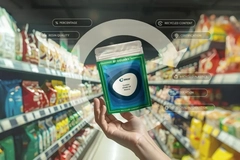“Shocking and alarming”: UK supermarket plastics rise to almost a million metric tons annually, EIA report reveals

02 Dec 2019 --- Despite public commitments to reduce the use of virgin plastic, the plastic packaging sold by major UK supermarkets has risen to more than 900,000 metric tons annually, an Environmental Investigation Agency (EIA) report has found. Conducted in partnership with Greenpeace, the report - Checking Out on Plastics II: Breakthroughs and backtracking from supermarkets - revealed that seven from the top 10 supermarkets had increased their plastic footprint. Only Waitrose, Tesco and Sainsbury’s have achieved small reductions.
The report indicates that there has also been an “alarming” rise in sales of so-called “bags for life,” with millions of shoppers purchasing them as a single-use option even though they contain far more plastic than conventional single-use carriers.

In 2019, 10 supermarkets representing 94.4 percent of the grocery retail market reported selling 1.5 billion “bags for life,” up by about 25 percent on last year based on market share. Iceland saw sales of bags for life rise tenfold, from 3.5 million to 34 million.
In real terms, 1.5 billion bags for life sold in the past year represents about 54 per household in the UK – or 22 bags each per man, woman and child.
“We’re urging supermarkets to work towards eliminating single-use plastic altogether by offering packaging-free products or switching to reusable and refillable packaging. False solutions to the plastic pollution crisis – such as swapping plastic for cardboard or simply making plastic thinner – are unacceptable,” EIA states.
“It’s shocking to see that despite unprecedented awareness of the pollution crisis, the amount of single-use plastic used by the UK’s biggest supermarkets has actually increased in the past year,” Juliet Phillips, EIA Ocean Campaigner says.Iceland dropped from top spot in the plastics league table last year to seventh place this year, while Sainsbury’s went from bottom to third place (Source: EIA).
“Our survey shows that grocery retailers need to tighten up targets to drive real reductions in single-use packaging and items. We need to address our throwaway culture at root through systems change, not materials change – substituting one single-use material for another is not the solution.”
The report revealed that the big brands supplying supermarkets were a driving factor behind the rise in plastic packaging, indicating supermarkets had failed to compel suppliers to take action.
Sharing this concern, a recent Break Free From Plastic report has blasted FMCG heavyweights for only offering “false solutions to the plastic pollution crisis they have created.” The report named Coca-Cola, Nestlé and PepsiCo as the world’s “top polluting companies” following 484 cleanups in over 50 countries across six continents.
Solutions to the global plastic crisis must focus on preventing more plastic from entering the market and on implementing and supporting zero waste initiatives, alternative delivery systems and reusable products, according to the Plastic Atlas, published last month by the Heinrich Böll Foundation and Break Free From Plastic. The report concluded that “many companies resist the call to reduce plastics production [because] accepting the need to do so would force them to abandon their optimistic growth projections, upend their ingrained business practices that depend on single-use plastics, and accept lower profits.”
Adding fuel to the fire, roughly 48 percent of packaging used by major UK supermarket chains cannot be easily recycled, according to a recent Which? Survey.
Another factor in the rising volume of plastic packaging was that supermarkets which saw their sales grow last year failed to cut plastic along the way, the EIA-Greenpeace report notes. This means that by selling more goods, the supermarkets inevitably sold more plastic too.
Key findings from Checking Out on Plastics II include:
Waitrose and Morrisons were the best performers, while Asda and Aldi were bottom of the table;
Iceland dropped from the top spot last year to seventh place this year;
Sainsbury’s went from bottom of the 2018 league table to third place this year;
Eight supermarkets pumped out 58.3 billion pieces of plastic packaging;
Other leading brands failed to respond to the survey for the second year running, including Ocado, Best-One and Booker Group.
Waitrose, Tesco and Sainsbury’s offer glimmer of hope
Waitrose, Tesco and Sainsbury’s achieved small reductions in plastics packaging usage, while only Tesco gave suppliers an ultimatum to cut excessive plastic or have products delisted, the report found. “We think the other supermarket chains should follow suit,” EIA urges.
As part of its “4Rs” strategy to reduce dependency on virgin plastics, Tesco announced its ambition in November to remove one billion pieces of plastic from products for sale in stores nationwide by the end of 2020. The retailer will explore new opportunities to reuse its packaging and ensure that anything left is all recycled as part of a closed loop. “If packaging can’t be recycled, it will have no place at Tesco,” states the multinational grocery chain.
In April, Tesco began trialing the collection of difficult to recycle plastic packaging and recycling it through a new partnership with Recycling Technologies. The waste management specialist has developed and patented a process to turn waste plastic back into oil, Plaxx – a material that can then be used in the manufacture of new plastic.
Waitrose scored highly because “it cuts the amount of plastic packaging used and is looking to scale-up innovative trials for packaging-free refill stations for products such as coffee, rice, pasta, wine and detergent,” the report reads.
In a bid to address concerns of single-use plastic packaging pollution, Sainsbury’s announced in September a new commitment to reduce its plastics packaging by 50 percent by 2025.
Meanwhile, Morrisons became the first retailer to set a quantified target to increase reusable and refillable packaging. It also started its own refill trials and made loose and refillable ranges 10 percent cheaper than packaged counterparts.
By Joshua Poole












